










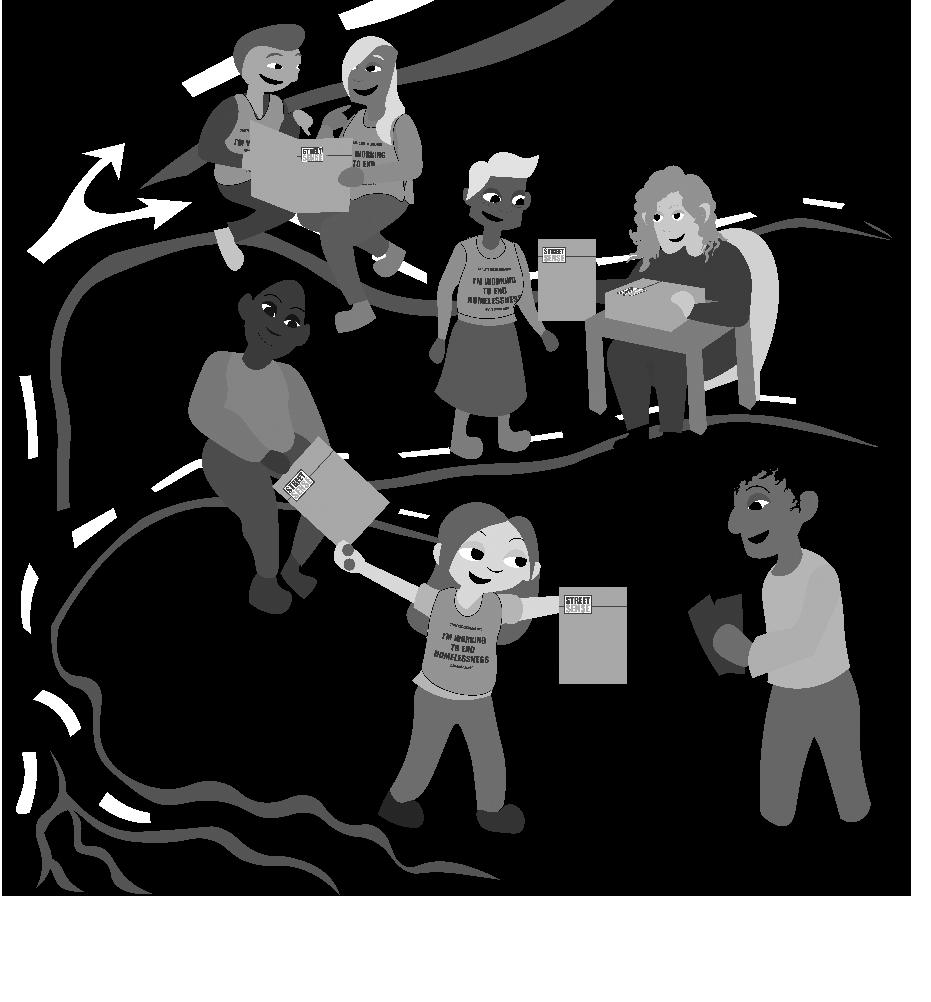
We provide people experiencing homelessness and poverty in D.C. with a low-barrier economic opportunity to earn an income. Each one of our vendors functions as an independent contractor for Street Sense Media, managing their own business to earn an income and increase stability in their lives.
83,415 papers in 2022
Abel Putu, Aida Peery, Al Edmonson, Akindele
Akerejah, Amia Walker, Amina Washington, Andre Brinson, Andrew Anderson, Angie Whitehurst, Anthony Carney, Antoinette Calloway, Archie Thomas, Beverly
Sutton, Brianna Butler, Burton Wells, Carlos Carolina, Carol Motley, Carlton Johnson, Charles
Armstrong, Charles Woods, Chon Gotti, Chris Cole, Conrad Cheek, Corey
Sanders, Daniel Ball, Darlesha Joyner, David Snyder, Debora Brantley, Degnon (Gigi) Dovonou, Dominique Anthony, Don Gardner, Donté Turner, Doris Robinson, Earl Parker, Dwayne Butler, Eric Glover, Eric Thompson-Bey, Erica Downing, Evelyn Nnam, Floyd Carter, Franklin Sterling, Frederic John, Freedom, Gerald Anderson, Greta Christian, Harriet Fields, Henrieese Roberts, Henry Johnson, Ivory Wilson,
Jacqueline “Jackie” Turner, Jacquelyn Portee, James Davis, James Hughes, Jeanette Richardson, Jeff Taylor, Jeffery McNeil, Jeffrey Carter, Jemel Fleming, Jennifer McLaughlin, Jermale McKnight, Jet Flegette, Jewel Lewis, John Alley, John Littlejohn, Josie Brown, Juliene Kengnie, Kenneth Middleton, Khadijah Chapman, Kym Parker, Laticia Brock, Laura Smith, Lawrence Autry, Levester Green, Lu Potter, L. Morrow,

Mango Redbook, Marc Grier, Marcus McCall, Mars, Martin Walker, Mary Sellman, Maurice Spears, Melody Byrd, Michael Warner, Michele Modica, Michele Rochon, Morgan Jones, Nikila Smith, Patricia Donaldson, Patty Smith, Phillip Black, Queenie Featherstone, Rashawn Bowser, Reginald Black, Reginald C. Denny, Ricardo Meriedy, Richard “Mooney” Hart, Rita Sauls, Robert Warren, Rochelle Walker,
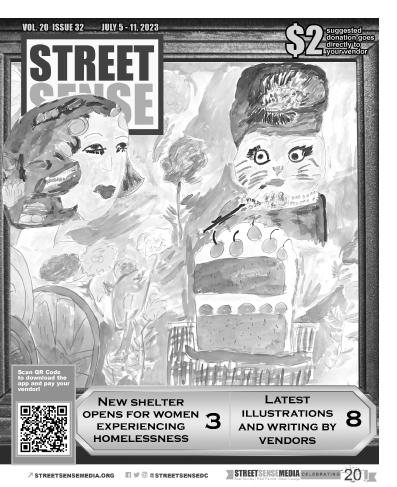
You pay
Vendors keep all of your contribution!
The Cover COVER ART BY SYBIL TAYLOR, COVER DESIGN BY ATHIYAH AZEEM
Ron Dudley, Sasha Williams, Shuhratjon Ahmadjonov, Sybil Taylor, Tonya Williams
Vennie Hill, Warren Stevens, Wendell Williams, William Mack
BOARD OF DIRECTORS
Mary Coller Albert, Blake
Androff, Nana-Sentuo
Bonsu, Jonquilyn Hill, Stanley Keeve, Clare
Krupin, Ashley McMaster, Matt Perra, Michael Phillips, Daniel Webber, Shari
Wilson, Corrine Yu
CHIEF EXECUTIVE OFFICER
Brian Carome
DIRECTOR OF DEVELOPMENT AND COMMUNICATIONS
Doris Warrell
DIRECTOR OF PROGRAMS
Darick Brown
DIRECTOR OF VENDOR EMPLOYMENT
Thomas Ratliff
Agroup of women gathered on the fifth floor of a housing complex in Logan Circle on June 15 to celebrate the opening of Sharon’s Place, a new transitional housing facility and residential employment program for women experiencing homelessness over the age of 18 in D.C.
The property is the latest addition to local homeless services nonprofit N Street Village’s housing portfolio which includes Miriam’s House, Erna’s House, Diane’s House, Step-Up Rapid Rehousing, Capitol Vista, Patricia Handy Place for Women, Phyllis Wheatly YWCA and the their Flagship location.
Named after Sharon Hart, a homeless rights advocate who dedicated 30 years of her life to helping the women of N Street Village, this new facility will provide long-term (2 years) temporary housing for those enrolled, alongside support to finding jobs or stabilizing current employment.
“Too often, women working struggle to manage the myriad of stresses they face every day — this new program gives them the space and support to rest and stabilize,” Kenyatta T. Brunson, president and CEO of N Street Village, said to residents and supporters during the opening. Support and associated services will include case management, assistance for preparing for and finding new jobs, financial literacy guidance and referrals for job training and GED assistance.
N Street Village is the self-proclaimed largest provider of housing and supportive services for women experiencing homelessness in D.C.
Ward 2 Councilmember Brooke Pinto spoke at the opening about her experience volunteering with N Street Village while she attended law school at Georgetown University.
In her comments, Pinto pointed to the recently finalized city budget for fiscal year 2024 and said she believes it will help address
This week, Street Sense will be republishing award-winning stories that were recognized at this year’s local Society of Professional Journalists awards ceremony. Annemarie Cuccia’s reporting on housing vouchers was a finalist in the series category for weekly newspapers.
Originally published in October 2022, our page 10 article is being run with an update. Just a few days ago, the D.C. Housing Authority began implementing rent reasonableness, one of the
VENDOR PROGRAM ASSOCIATES
Aida Peery, Clifford
Samuels, Chon
Gotti
VENDOR PROGRAM
VOLUNTEERS
Beverly Brown, Roberta Haber, Ann Herzog, Madeleine
□ This year’s community celebration will be Thursday, July 13, at noon. Come for lunch and fellowship! Sign up to attend in the admin. office.
McCollough, Dylan
Onderdonksnow, Amelia Stemple, Tyler Bruno
MANAGER OF ARTISTIC WORKSHOPS
Maria Lares
EDITOR-IN-CHIEF
Will Schick
pressing housing needs. The budget provides for $33 million in federal funding to Emergency Rental Assistance Programs (ERAP) for this year, yet will not reopen for new applications, and will use funding to support those already in the program, as well as to fund Rapid Rehousing Programs. The finalized budget will, however, restore money for legal services for those facing eviction, for homeless services and funds 230 new Permanent Supportive Housing vouchers.
“When residents are given the means and support to thrive, they demonstrate the wide-spanning potential that everybody possesses,” Pinto said.
Carlita Walker, a former N Street Village resident, said that had a program like Sharon’s Place been in existence at the time she seeked help, she would have jumped at the chance to be involved with it.

“When I lost my husband in 2007, I guess I had a breakdown because it was unexpected, so I had to adjust all over again,” she said
Walker credits N Street Village with helping her secure her current home, which she has been in for 12 years.
Sangita Joshi, case management director at N Street Village and who is overseeing Sharon’s Place, said that while it is a first of its kind employment model in D.C. in the way that it provides housing and opportunity for employment simultaneously, it is expected to be transformative and demonstrate a model that could be replicated and expanded in the future.
House of Ruth, So Others Might Eat and New Endeavors for Women provide similar services in D.C., yet none can be directly compared to Sharon’s Place, given its small scale which might provide for more one on one, culturally competent client service.
Joshi added that while there are few filled spots in Sharon’s Place, intake will be continuous until they are at capacity.
□ Wondering if the office is closed today? Curious about the workshop schedule? Keep up with the latest vendor information at streetsensemedia.org/vendorinfo
□ Receive extra newspapers for referring someone you know to new vendor orientation. Every Tuesday and Thursday at 2 p.m.
□ Vendors continue to receive free papers for proof of vaccination.
Greta Christian July 8Read this democratically elected code of conduct, by vendors, for vendors!
1. I will support Street Sense Media’s mission statement and in so doing will work to support the Street Sense Media community and uphold its values of honesty, respect, support, and opportunity.
policies covered in this story. Please see the last few paragraphs for the most recent news. Additionally, page two has a new look! We will be running a set of new graphics every week that illustrates the many programs and opportunities we have at Street Sense Media.
Will Schick, Editor-in-Chief
DEPUTY EDITOR
Kaela Roeder
PRODUCTION EDITOR
Athiyah Azeem
STAFF REPORTER
Annemarie Cuccia
EDITORIAL INTERNS
Cole Kindiger
Jessica Rich, Casey Bacot
ARTISTS-INRESIDENCE
Ariane Mohseni (Film), Bonnie Naradzay (Poetry), David Serota (Illustration), Lalita Clozel (Film), Willie Schatz (Writing), Leslie Jacobson
(Theater), Roy Barber (Theater), Rachel Dungan (Podcast)
ARTS EDITOR (VOLUNTEER) Austine Model OPINION EDITOR (VOLUNTEER)
Candace Montague
EDITORIAL VOLUNTEERS
Josh Axelrod, Ryan Bacic, Lilah Burke, Chelsea Ciruzzo, Lenika Cruz, Alison Henry, Kathryn Owens, Andrew Siddons
2. I will treat all others, including customers, staff, volunteers, and fellow vendors, respectfully at all times. I will refrain from threatening others, pressuring customers into making donations, or engaging in behavior that condones racism, sexism, classism, or other prejudices.
3. I understand that I am not an employee of Street Sense Media but an independent contractor.
4. While distributing the Street Sense newspaper, I will not ask for more than $2 per issue or solicit donations by any other means.
5. I will only purchase the newspaper from Street Sense Media staff and volunteers and will not distribute newspapers to other vendors.
6. “I will not distribute copies of “Street Sense” on metro trains and buses or on private property.”
7. I will abide by the Street Sense Media Vendor Territory Policy at all times and will resolve any related disputes with other vendors in a professional manner.
8. I will not sell additional goods or products while distributing “Street Sense.”
9. I will not distribute “Street Sense” under the influence of drugs or alcohol.
10. I understand that my badge and vest are property of Street Sense Media and will not deface them. I will present my badge when purchasing “Street Sense” and will always display my badge when distributing “Street Sense.”
Street Sense first published this article in June 2022, just days after the National Park Service (NPS) closed an encampment at Union Station. Since then, both NPS and the D.C. government have begun closing more encampments. NPS removed over 70 people from McPherson Square in February and plans to have all encampments on federal land cleared by the end of this year. D.C., meanwhile, is increasing the number of encampments it removes and is closing some with little notice, as Street Sense recently reported. Street Sense last caught up with Vicki Paige, featured in this story, in November. At the time, she was still sleeping outside.
Vicki Paige was determined not to move. As she settled into a wrought-iron garden chair in Columbus Circle across from Union Station, she watched with skepticism as her neighbors packed for the day’s encampment removal.
“The police will be the ones who will have to remove me,” Paige said, pausing a playlist of her favorite songs and placing her headphones in her lap. “If I’m leaving my home, I need to know where I can go. And they’re not explaining that to me.”
On June 1, 2022, the National Park Service (NPS) led a long-planned encampment clearing of the area, citing health and safety concerns. Union Station is also set to be renovated in the coming years. Unlike recent closures undertaken as part of Mayor Muriel Bowser’s Coordinated Assistance and Resources for Encampments (CARE) pilot, this closure was not paired with any official effort to match residents with housing vouchers.
This clearing came amid an ongoing debate over what the city should do with a growing number of encampments. People experiencing homelessness often turn to encampments as a last resort while they search for permanent housing, particularly if they are wary of the conditions and rules in emergency shelters. When an encampment is cleared, its residents generally scatter throughout the city. This makes it hard for caseworkers to stay in touch with former residents, undermining the goal of connecting people experiencing homelessness with housing, according to Christy Respress, the executive director of D.C.based social services organization Pathways to Housing.
The CARE pilot — which so far has removed four encampments — attempted to address this problem by evicting unhoused residents from encampment sites while offering to help them obtain housing vouchers. The program began in 2021 as part of Bowser’s still-unfulfilled pledge to end chronic homelessness in D.C., with 4,410 people still experiencing homelessness as of this year’s point-in-time count. Administered by the Office of the Deputy Mayor for Health and Human Services (DMHHS), the pilot program has drawn criticism for uneven implementation that left 40 people unhoused across four sites, as well as for inflicting unnecessary trauma on residents during encampment closures by forcing them to move without first securing housing. Supporters of the CARE pilot contend the existing conditions are not safe for the unhoused residents or the community at large.
The area around Union Station has been a longtime target for encampment clearings and closures, which the city has ramped up in the last few years. The city began trying to shut down certain encampments in 2019 and 2020, partially to enhance “pedestrian walkways,” a reasoning heavily critiqued by outreach workers. NoMa underpass encampments were closed altogether in 2021 as part of the CARE pilot. Many of the residents at the Union Station encampment said they previously lived at the site of the NoMa underpasses.
The June 1, 2022, clearing displaced around 35 people. In some cases, NPS workers trashed residents’ belongings instead of storing them, despite prior commitments. U.S. Park Police tased one resident who was experiencing a mental health crisis and involuntarily committed her to a mental health facility, officials confirmed. According to Aaron Howe, the co-founder

of Remora House, it’s common for NPS-led cleanups to be more traumatic for residents than ones conducted by the city, though the clearing at Union Station was more considerate than some in the past.
“They’re always harder,” Howe said.
Formed at the start of the pandemic, the encampment at Columbus Circle grew to about 35 tents, some of which were gone before the previous week’s clearing. NPS, which has control of the property, chose not to enforce the no-camping zone during the last two years. Since the onset of the pandemic, many people experiencing homelessness have opted to live in encampments, hoping to avoid exposing themselves to COVID-19 in crowded shelters. This is in line with guidance from the U.S. Centers for Disease Control and Prevention, which confirmed the virus could be more easily spread in congregate shelter settings.
In a March 24, 2022 letter announcing its plans to remove the encampment, NPS asked the District to provide housing assistance for encampment residents. But the clearing was not linked to any permanent housing program. Pathways and Project H3, another local nonprofit, spent weeks attempting to connect unhoused residents in the area with permanent housing vouchers, a process that usually stretches over many months and that is constrained by the availability of vouchers.
Some residents were eligible for PEP-V, a housing program created during the pandemic for individuals who are medically vulnerable. Others who were matched with a Permanent Supportive Housing voucher but are still looking for an apartment moved into what’s known as “bridge housing.”
But most people were forced to relocate without assistance, Respress said.
That was true for Kenan Bell, an Illinois native who missed his train at Union Station three weeks ago. “And next thing you know, I’m out here,” he said. Instead of watching his child graduate in Miami, he spent the day going back-andforth between Union Station and his next place as he moved his things.
Like Bell, other residents of the encampment who were not able to get housing had to find a new place to stay. Smalls Chin said she was one of several people headed to a nearby park on city property. While most encampment residents felt they should be allowed to stay in Columbus Circle, Chin said she understood the Park Service’s position, at least to some extent. In the month and a half she’d been there, she’d seen enough rats to believe the area needed cleaning.
“They’re not doing this to make it hard,” she said.
But the day was hard anyway. Bell was losing the first living arrangement he’d found in D.C., and Chin lost some members of her informal family. And many of the people living there in Columbus Circle lost everything they had to leave behind.
Even the night before the clearing, resistance to movement was in clear view. Below the NPS placards announcing the planned encampment closure, handmade cardboard signs read “we not leaving bruh” and “we have the right 2 land bread n water.”
The next day, that resistance grew.
A Virginia native, Paige had been at the Union Station encampment since September 2021. After 10 months, she came to see the paved corner she’d claimed with two tents and two planters as hers. When NPS officials arrived, she told them she’d only move if ordered to do so by the Park Police. But the choice was never really hers; after the police promised to
arrest her if she stayed put, she began packing up. Even so, Paige said, she was only moving because she had help from Project H3: “Otherwise, they would just have to arrest me.”
Before the clearing began, outreach workers worried that several residents would refuse to move, especially those who were at a greater risk for mental health crises. To successfully engage with encampment residents who experience less stability requires maximum time and effort, according to Ami Angell, the founder and director of outreach for the H3 Project.
“Several of the individuals who want to remain in place today are the people who would most benefit from extra assistance, and I’m really just not seeing much support here for them,” she said.
M, who is being referred to using a pseudonym since she may not have been in a mental state to give consent to her name being used, was the last person left at the encampment. She’d been talking to outreach workers for about an hour and was almost willing to move when Park Police approached her, according to Howe, who witnessed the incident. Police officers
soap inside the train station.
“I’m just preparing to comply and lay down after,” he said. He’d already gotten rid of several pounds of belongings and was carefully packing 20 more items into various bags. He said the clearing was causing him to lose about half of his possessions.
When NPS arrived at 7 a.m., outreach workers from Pathways, Project H3, DMHHS and the D.C. Department of Behavioral Health were talking to a few residents who did not know where they would go. Over a dozen NPS employees, who Litterst confirmed were facility management workers, donned protective full-body suits.
The clearing was scheduled for just 90 minutes, but took at least four hours. As the morning progressed and the temperature approached 100, there were eight Park Police officers in the park. NPS employees first emptied the trash cans in Columbus Circle and then began tossing whole tents into the garbage trucks, picking them up with rakes.
The fate of belongings left behind by residents was unclear. When the city clears encampments, its protocol requires that all clean items left behind be stored for 60 days. Respress said NPS had initially promised to do the same, but advocates watching that day said the promise was not upheld.
At one point, Angell grabbed a clean, packed suitcase out of the hands of an NPS worker as they were tossing it into the garbage truck. Angell said outreach workers saved several items in good condition from being thrown away, and Howe said NPS workers trashed tents that outreach workers thought would be stored. While Park Police told Angell storage was still an option, there seemed to be a disconnect with the NPS workers, she said. In a later statement, the NPS confirmed items collected would be held for 60 days but did not respond to criticism that items were trashed instead of stored.
Losing a tent with belongings inside doesn’t mean losing just housing for encampment residents, but also clothes, personal mementos and important documents needed to obtain permanent housing. In addition to delaying the housing process, this can make it harder to survive in the meantime, harder to look presentable for a job interview, and harder to stay warm in the winter or out of the sun in the summer.
“This is everything the individuals we work with have — like it is their livelihood in these tents,” Angell said.
told her they would remove her if she did not leave her tent, Howe said. M became agitated and sprayed a caseworker with a cleaning product before holding scissors above her head and lunging at officers, according to NPS Chief of Communications Mike Litterst. The police responded by tasing and then cuffing her. Though Park Police did not file charges, M was involuntarily committed and NPS workers threw away most of her belongings, including her tent, Litterst said. When she gets out, she will learn she’s lost everything.
The police reaction was widely decried by outreach workers and housing advocates.
“We know that that is the absolute worst outcome,” Respress said. “The only worse outcome would be if someone was shot.”
By 8 a.m., Robert Wade was already tired. He’d been living at the encampment since Feb. 10, 2022 and wasn’t planning to go far, hoping he could still take advantage of the water and
Sixteen hours before police removed her from the encampment, M sat in front of her tent, sipping the last of an ice water with sugar from Starbucks. She normally gets an iced English breakfast tea with lots of sugar and cream, she said, but she didn’t have any money that day.
M had been at Union Station for about a month, and in the NoMa underpasses for three years before that.
She doesn’t remember a lot of her childhood, where she’s from, or where she got the scars on her body. She doesn’t like that it snows in D.C., but the above-80 weather doesn’t faze her.
“It’’s a good thing I can bring sun,” she said.
That day’s sun made her speculate on what the encampment could be: Everyone throws their trash away, she said, and with a few more cans they wouldn’t overflow. More shade would keep people cool. The residents could even have events on the plaza outside their tents. It could really be a community.
“So why do they want people out so bad?” M asked.
By 8 a.m., Robert Wade was already tired. He’d been living at the encampment since Feb. 10 and wasn’t planning to go far, hoping he could still take advantage of the water and soap inside the train station.
One year after the Supreme Court overturned Roe v. Wade, ending nearly five decades of constitutionally protected abortion rights, the landscape of abortion access in the D.C. region remains precarious, with patients and providers alike bracing for an uncertain future.
As East Coast states like Florida, West Virginia and North Carolina passed legislation restricting — or altogether banning — access to abortion care, lawmakers in Maryland have acted in opposition, expanding who can provide abortions. A stronghold for reproductive care before the Dobbs decision, D.C. has also worked to expand access, increasingly serving as a destination for out-of-state travelers whose local options for abortion care have cut been cut off.
In Virginia, now the southernmost state without a post-Roe ban, the future of abortion access remains a contentious debate — and one expected to heat up in this fall’s off-off year election where abortion is expected to be a top line issue.
Dueling lawsuits filed last year — one attempting to restrict access to mifepristone, the medication abortion pill, and another attempting to protect it — are still working through the lower courts after the Supreme Court issued a stay earlier this spring. The outcomes are likely to impact all three jurisdictions.
The unique interconnectedness of this politically divided region, D.C.’s lack of statehood and the interstate collateral of abortion law without federal protections means that changes to laws in one jurisdiction will undoubtedly impact access even in protected areas.

Here’s where things stand, post-Roe, in the D.C. region:
Abortion is currently legal in Virginia within the first and second trimesters, a fact that isolates it from almost all of its neighbors. This fall’s election, however, could open an avenue for a GOP-backed ban if Republicans take control of the General Assembly.
Shortly after Roe fell last year, Republican Gov. Glenn Youngkin announced his intent to introduce a 15-week abortion ban. This came after another attempt of Youngkin’s to restrict abortion access when he tried and failed to add an amendment to the state’s two-year budget bill last year that would’ve prevented state funds from paying for abortions in cases of fetal anomalies. (Low-income patients on Medicaid can only use public dollars for abortion procedures in certain situations, like if a patient’s life is at serious risk, if the pregnancy is a result of rape or incest and the patient has reported the incident or if the fetus has a “documented incapacitating abnormality.”)
In January, the narrowly Democratically-controlled state senate defeated Youngkin’s proposed ban, which was introduced by Republican Sen. Steve Newman. It would have banned abortions at 15 weeks, with exceptions for rape, incest or the physical well-being of the patient. But with an upcoming general election where all 140 General Assembly seats are on the ballot, Republicans have a renewed chance to push an abortion bill through the General Assembly should they win control of both houses. Youngkin has pledged to push for a 15-week ban should the GOP take the full General Assembly this fall.
“As we look toward November, the stakes for Virginians in this year’s elections are crystal clear: our Senate majority has been the one thing standing between Virginians and the
Republicans’ extreme agenda,” said Senate Democratic Caucus Chair Mamie Locke in a statement, immediately following the primary election.
Virginia Democrats see abortion as their election-winning issue this year and are framing Republican attempts to restrict access as an out-of-touch position that doesn’t reflect the majority of Virginians. A January 2023 poll from Christopher Newport University’s Wason Center found that more than 70% of Virginians surveyed supported either maintaining the current abortion law or further removing restrictions
Abortion already proved itself to be a winning issue for some Democrats in June’s primary. Incumbent Sen. Joe Morrissey, a conservative, pro-life Democrat, lost to Del. Lashrecse Aird in the Richmond area. Morrissey maintained a murky position on abortion, stating his personal objection to the procedure and saying once that he was keeping an “open mind” to restrictions. Aird’s campaign centered heavily on her commitment to protecting abortion rights.
Mike Scheinberg, the director of operations at Falls Church Healthcare Center in Northern Virginia, said that as the fate of abortion access remains in flux, providers have to stay prepared to pivot with strategies in place, should lawmakers attempt to restrict access.
“We can’t just stop and say, ‘okay we need to regroup,’” Scheinberg told DCist/WAMU in an interview. “We need to keep on providing services. It’s all about the planning, it’s all about trying to figure out what’s going to happen next.”
Providers in Virginia (and across the nation) faced a similar period of uncertainty earlier this year, when a federal judge in Texas issued a nationwide injunction on the Food and Drug Administration’s (FDA) approval of mifepristone, a medication abortion pill that’s been widely used since it was first approved in 2002. The U.S. federal government ultimately appealed that
ruling, and the Supreme Court issued a stay, meaning access remains unchanged, for now, as the case plays out in the lower courts.
Medication abortions account for more than half of all abortions in the U.S., according to the Guttmacher Institute, and are often logistically and financially easier than procedure abortions. Scheinberg said that while the country waited for the various appeals to be made and stays issued, Falls Church Healthcare Clinic made tons of photocopies of new guidelines assuming that some level of FDA approval was successfully scaled back.
“I had everything ready to roll, because we had patients that next Saturday, and on Friday we were waiting to find out — do we need to change those guidelines?” he said. “Fortunately we were able to continue business as usual, but we have to keep watching because we can’t be surprised by this.”
Unlike other states, Virginia did not move to stockpile mifepristone or misoprostol, the second pill used in the two-pill medication abortion regimen. When used together, they have a 98% efficacy rate. In the case that mifepristone was banned or its usage restricted, providers would rely on misoprostol alone, which can be more painful for a patient but still shows an efficacy rate of 95%. As things stand currently, Virginians can still access both medications and also get them delivered by mail.
In Maryland, abortion is legal up until a fetus is “viable,” meaning it could survive outside of the uterus. (This typically occurs between 24-26 weeks, but there is no fixed definition.) Marylanders can also access medication abortion by mail.
Before the Dobbs decision came down, the General Assembly passed legislation expanding who could provide abortions, bolstering the network of available providers in the state. The law removed a restriction that prevented nurse practitioners, nurse midwives and physician assistants from providing abortions, and set aside $3 million for a program that would train these newly-eligible providers. Former Republican Gov. Larry Hogan, however, refused to release that money in 2022. When Democratic Gov. Wes Moore assumed office, doing so was among his first moves as governor.
More protections came during the 2023 General Assembly session. With Democrats controlling both chambers and the governor’s mansion, lawmakers passed a shield law, essentially protecting out-of-state patients and providers from legal retribution if they travel to Maryland from a state with an abortion ban. In another move, lawmakers voted to put an abortion referendum on the 2024 ballot, letting voters decide whether to enshrine abortion rights into the state’s constitution. That measure is likely to pass — a poll from the Washington Post and the University of Maryland last fall found that 78% of Maryland voters supported such an amendment.
The state has long been a destination for out-of-state residents seeking abortions, a status that has only elevated since Roe’s fall.
In September of last year, Jim Justice, the Republican governor of neighboring West Virginia, signed a total abortion ban into law, effective immediately, making Maryland the closest state for abortion care.
The Women’s Health Clinic of West Virginia, the state’s only provider, was forced to close its doors. The director of that clinic, Katie Quiñonez, is opening a new location, now just over the state line in Cumberland, Maryland, hoping to fill the gap caused by the total ban.
“We know, logically, that when abortion is banned in a single state, the consequences of that abortion ban do not stay within
those states’ borders,” Quiñonez told DCist/WAMU. “We know that the people who can, and who have the privilege and the resources to, will travel outside of their state to access abortion care in the nearest state where it is legal to do so.”
The forthcoming center, Women’s Health Clinic of Maryland, is slated to open by the end of July and will offer a host of services, including procedural and medication abortion, birth control and contraception, STI testing and gender-affirming hormone therapy.
But while Maryland’s statewide laws protect abortion rights, access is limited and uneven throughout the state. Western Maryland is an “abortion desert.” The closest options for care in Cumberland are either Pittsburgh, Pennsylvania, Hagerstown or Frederick, all of which require a long drive. Additionally, the Frederick clinic only offers medication abortion, while the Hagerstown location operates on a limited schedule, and only performs first-trimester abortions.
“Our communities have always needed more abortion providers, that’s the reality,” Quiñonez said. “Our communities deserve more access to health care, not less.”
Meanwhile, in Montgomery County, local lawmakers moved to support the county’s providers after Roe, creating a grant program for organizations that provide abortions, refer patients to abortion services or offer wraparound services to individuals seeking abortions.
D.C. lawmakers, like those in Maryland, acted to protect the many out-of-state travelers they anticipated would flock to the D.C. area in a post-Roe landscape. Councilmembers passed one bill (which went into effect this past February) protecting anyone in D.C. who seeks or self-manages an abortion from any penalties. A different bill from Ward 1 Councilmember Brianne Nadeau allows any D.C. resident
that’s sued for providing abortion access to someone from a state with abortion bounty laws to sue in return.
However, because D.C. is not a state, Congress approves D.C.’s laws and budget and thus has control over how the city funds abortion. For decades, lawmakers on Capitol Hill have maintained a budget rider that prevents the city from subsidizing the costs of abortions for low-income people, and the recent federal spending bill draft released by House Republicans upholds that ban.
Without any public dollars available to help poor people seeking abortions, those residents may turn to abortion funds for financial assistance. The D.C. Abortion Fund (DCAF) helps people pay for any stage of the process, including the medication and procedure itself, as well as lodging or travel. Jade Hurley, communications manager at DCAF, said that since Roe has fallen, both the number of callers has increased, and the average ask has gone up by hundreds of dollars.
“No one should have to pay for abortion care, but just the cost of getting the procedure is becoming pretty astronomical,” Hurley said.
The higher pledge amounts could also be influenced by the increase of patients from states like Florida, Georgia and Texas coming to D.C. for an abortion — longer travels cost more. Hurley said DCAF had a huge bump in “rage” donations after the Dobbs leak last May. Things have stabilized slightly in the past few months but she says DCAF’s mission remains to build a community of love and support around abortion, making sure they’re reaching the people who need their assistance most. The organization has reshaped its intake and data collection system to identify holes in populations they need to reach. They’re preparing to handle a further increase in out-of-state requests if North Carolina’s ban comes to fruition.
“When abortion is banned somewhere, it’s going to impact it everywhere.”
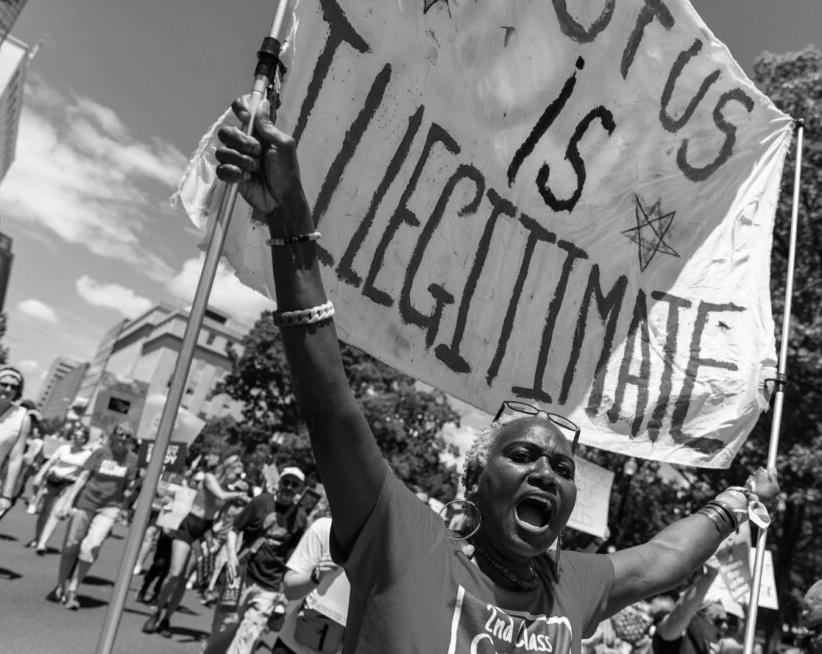
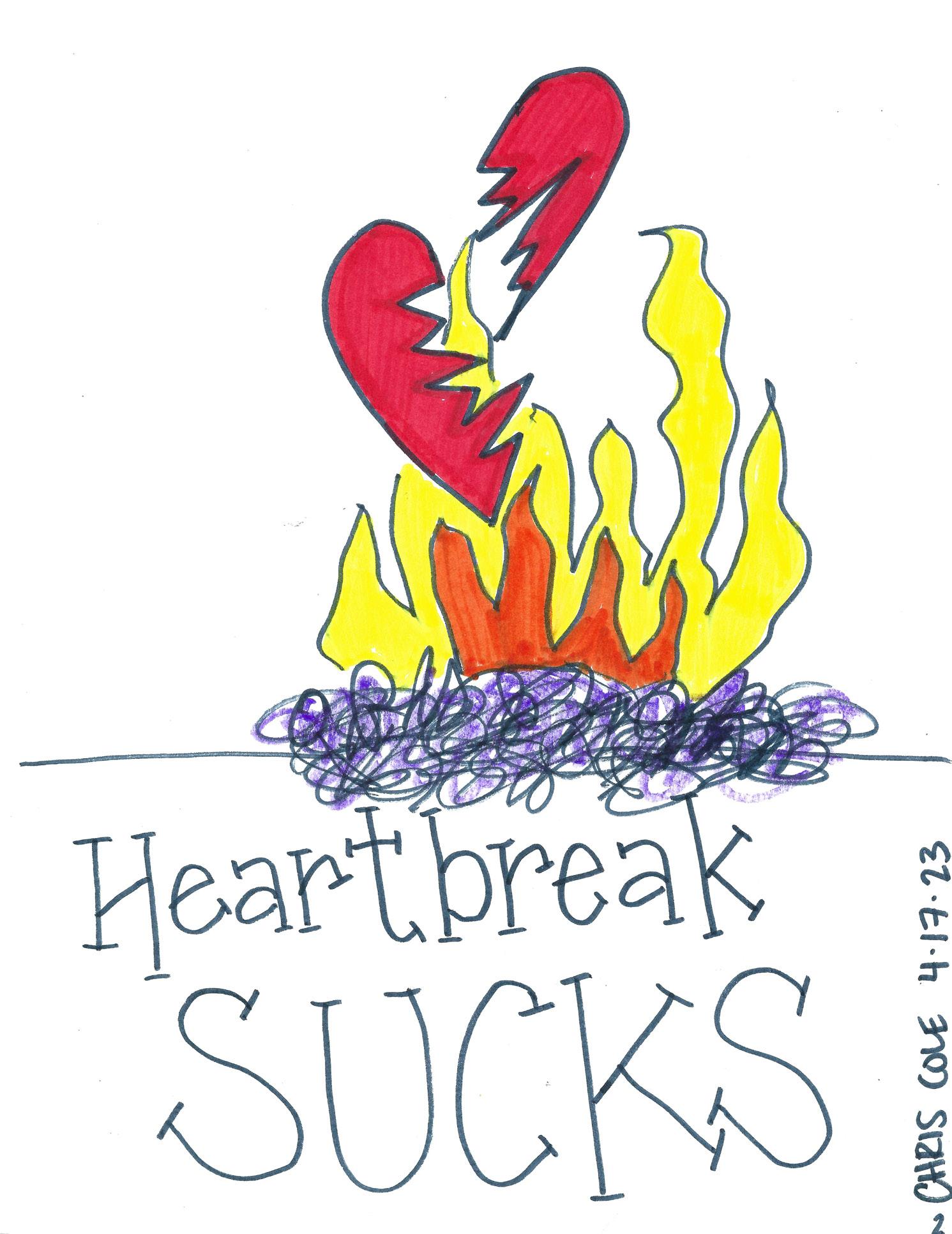




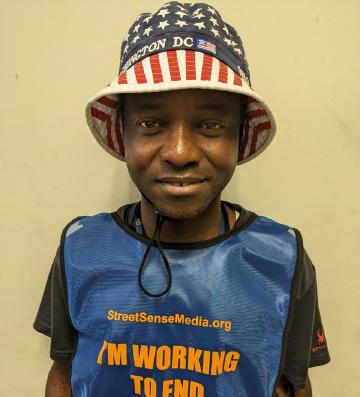
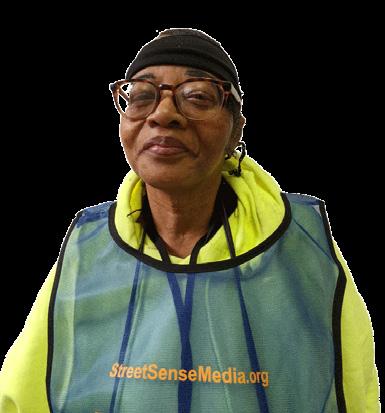

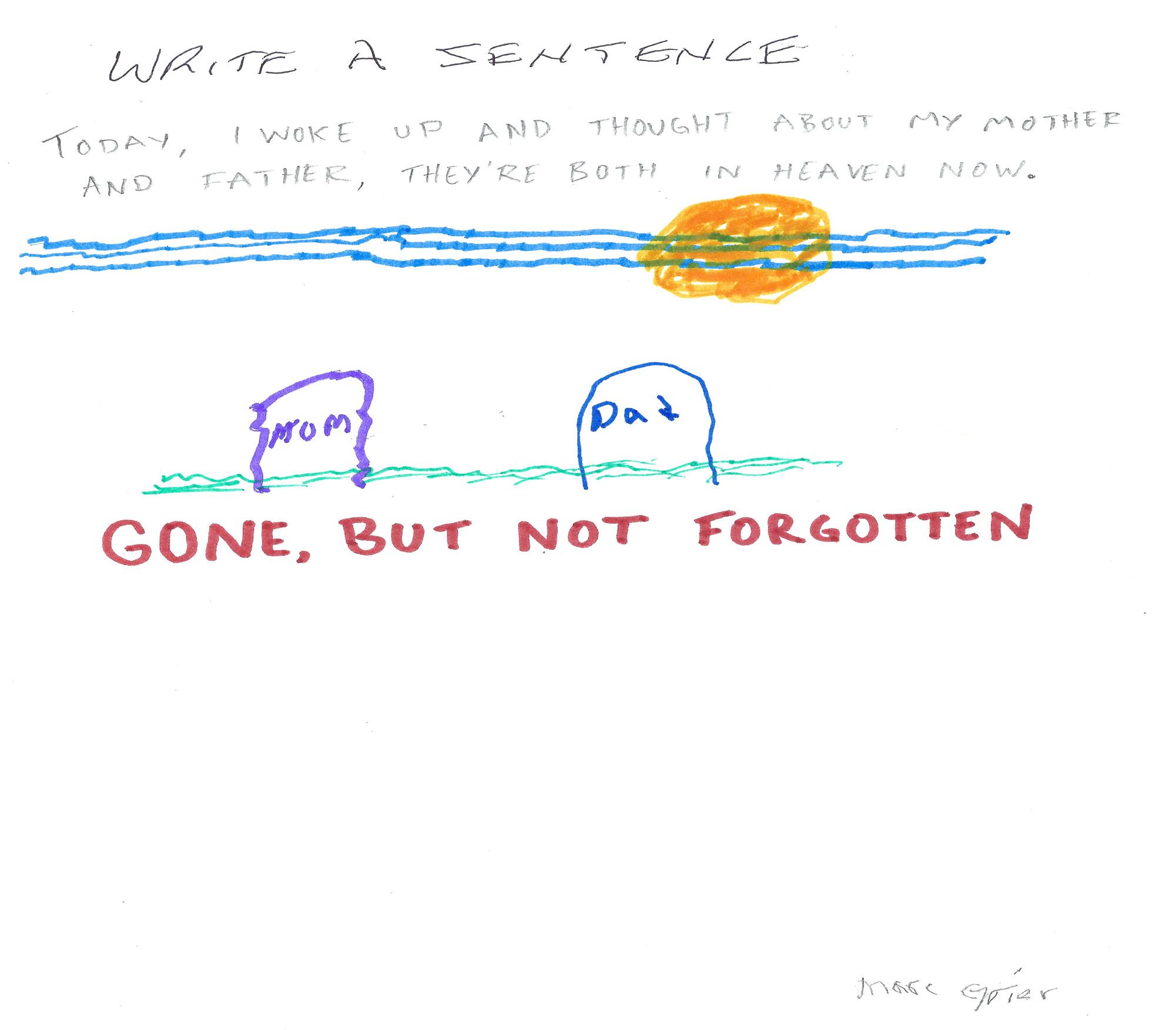

FREDERIC JOHN
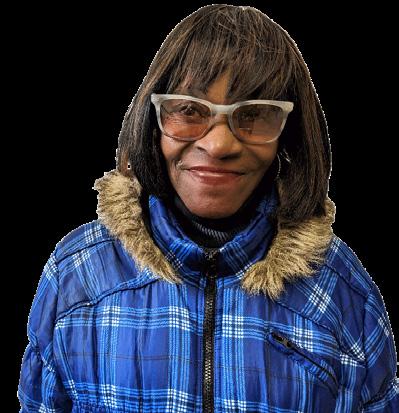
Artist/Vendor

A lonesome beam, projecting faintly from abysmal darkness, in the shadows of a much larger encrusted hulk — then, nothing.
I have never participated in a “deep dive” exploration. I never even snorkeled a reef colony, even half a dozen feet below the surface! I do, however, find it easy to channel the abject fervor subject to anyone trapped with the North Atlantic’s immense volume weighing them down.
Also, I am empathetic enough to envision the loss of any loved ones incumbent on their surviving families; attempting to grapple with a “scattering of souls...”

Today, I woke up and thought about my mother and father. They’re both in heaven now.AMIA WALKER Artist/Vendor
I would love to travel to the beach.
This story was originally published on Oct. 19, 2022.
People using housing vouchers in D.C. spent this past summer in limbo. In the spring, the D.C. Housing Authority (DCHA) deliberated changing the maximum value of all 20,000 vouchers the agency administers. If implemented, the change could have had major consequences, advocates and landlords warned, by inadvertently forcing thousands of people to move from their homes. Not until September 2022 did the agency make clear that no changes are imminent.
The city’s embattled housing authority recently came under fire in an unsparing assessment by the U.S. Department of Housing and Urban Development (HUD). While media attention focused largely on the low occupancy rates and subpar condition of DCHA-run public housing, the agency’s oversight of its voucher program is also lacking, according to the report. DCHA is out of compliance with several HUD voucher regulations, and has been widely criticized for failing to hold landlords accountable for high rental costs. Last summer, DCHA Executive Director Brenda Donald publicly stated that officials don’t know exactly how some of the Housing Authority’s current voucher rents were calculated (they were implemented long before she joined the agency last year). What’s clear, however, is that the existing rates DCHA uses are premised on years-old market conditions.
The agency is set to determine how to revise the value of the 20,000 vouchers it administers. In doing so, the agency will have to grapple with concerns that landlords are exploiting the program, and that people with vouchers are unable to find suitable homes to rent. The end result could have lasting consequences not just for D.C.'s voucher holders, but for all those in the city who rely on affordable housing.
Reginald Black lives in an apartment in Northwest D.C. Like many residents across the city, he relies on a housing voucher. He pays 30% of his income toward his rent in an apartment of his choice while the District covers the rest.
This subsidy is a lifeline for thousands of D.C. residents exiting homelessness or making too little to afford to live in the city. But many people with vouchers still experience housing instability, enduring discrimination from landlords, poor housing conditions and mounds of paperwork to receive their monthly subsidy. In May 2022, DCHA — the agency that administers the vouchers — almost added another complication.
That month, Black came home to find a letter from his landlord stuck in his door. It warned Black that DCHA was considering paying less for his voucher. But his overall rent wasn’t going down. If he received a smaller subsidy, Black knew he would no longer be able to afford to stay in the apartment.
Landlords and tenants across the city watched similarly alarming alerts fill their inboxes. The missives outlined DCHA’s plans to decrease the maximum value of all its housing vouchers. Charts made by landlords and homeless service providers proliferated across the community,
suggesting that up to 30% of voucher holders would be evicted if the Housing Authority followed through.
In September 2022, DCHA quashed its proposal after months of outcry. Officials have instead embarked on what’s shaking out to be a years-long process to reevaluate how much the agency will pay landlords to house people with vouchers. That amount — called a “voucher rent” — is supposed to be based on the literal cost of housing in D.C., but it also determines the city’s answer to a hotly debated question: Where should people who use vouchers be able to live?
The agency uses a complicated process for establishing the value of a housing voucher — so complicated, in fact, that DCHA Director Donald and her staff spent hours explaining it to the agency’s Board of Commissioners during this summer’s meetings. Officials say the complexity is unavoidable due to federal regulations and the nature of DC’s rental market.
The value of a housing voucher — i.e., the “voucher rent” — isn’t just a technical decision. It’s a key piece of the city’s housing policy. Set it too low, and people who use vouchers won’t be able to afford to live in middle- and upper-class neighborhoods, reinforcing D.C.’s intense racial and economic segregation. Set it too high, and landlords can take advantage of the high voucher rents, which can mean displacing other tenants to make more off renting to voucher holders.
There are three ways DCHA decides the value of a housing voucher.
First, the Housing Authority establishes the maximum value it will pay for any voucher in the city. In other words, no matter how much Black earns, his share of the rent (30% of his income) combined with DCHA’s share can’t exceed this cap.
Per federal requirements, the agency bases its calculations on a HUD assessment that establishes what it calls “fair market rent” for the region. Since the region includes lowercost areas like Northern Virginia and suburban Maryland, fair market rent understates the actual cost of housing in D.C.
So, DCHA multiplies fair market rent to get the maximum value of a voucher. Right now, it’s at 187% of fair market rent, almost twice the region’s. In practice, this means the agency can pay landlords up to $2,930 for a one-bedroom unit anywhere in the city. The maximum value fluctuates based on the type of unit, reaching $5,073 for a fourbedroom.
In May 2022, DCHA proposed to decrease the maximum value from the current 187% to 110% of small area fair market rent (a second number released by HUD that measures the price of housing based on ZIP codes). The agency worried it was paying landlords too much to rent to voucher holders, and saw lowering the maximum value as the most feasible way to stop that overpayment. DCHA nixed the proposal in response to objections from landlords as well as advocates for low-income Washingtonians, who argued that a lower maximum value would make it impossible for people with vouchers to find housing in neighborhoods with high rents. For Fiscal Year 2023, the maximum value will stay at 187% of fair market rent.
Black and DCHA don’t pay the maximum value of almost $3,000 for his apartment, however. Instead, he and most voucher holders are charged based on a second calculation, called the “neighborhood approved rent.”
Once DCHA sets a maximum value for the whole city, the agency turns to voucher rent caps for each of D.C.'s 59 neighborhoods. These neighborhood rents act like the maximum value but on a localized level, setting varying caps to reflect housing costs across the city. In wealthier areas, the neighborhood rent ($2,648 for a one-bedroom where Black lives) approaches the maximum value. In lower-priced neighborhoods, DCHA sets a lower approved rent, such as $1,400 for a one-bedroom.
DCHA plans to overhaul the current neighborhood rents by 2024. A very early draft, prepared by an outside consultant, suggests increasing rents for many three-, four- and fivebedroom units, which can be especially hard to find in D.C. Landlords in neighborhoods that are paid the least — such as Anacostia, Barry Farm, Petworth and Shepherd Park — would see across-the-board increases. Meanwhile, areas where DCHA is currently paying the most — for instance, Capitol Hill, Cleveland Park and Mount Pleasant — would see significant decreases.
DCHA hasn’t updated the neighborhood rents since 2016, and an outside review conducted last summer suggested the currently used figures are outdated. The agency is overpaying for studios and one-bedrooms in 33 neighborhoods and underpaying for all units in 12 other neighborhoods, according to the study. (DCHA has questioned the study’s accuracy, and is following up to confirm data.)
When Black was searching for an apartment, he could look anywhere that charged up to the neighborhood rent. But once he found one, the Housing Authority had to figure out a third number: the fair rent for that specific apartment, which is how much Black and DCHA would actually pay the landlord each month.
The Housing Authority calls determining the actual rent a voucher holder and the authority pay to a landlord the “rent reasonableness process.” Under this policy, landlords cannot charge voucher holders more than they charge people without vouchers for comparable units in the same building or neighborhood. DCHA’s rent reasonableness review is a built-in control for overpayment by unit. That’s important because neighborhood rents technically allow DCHA to pay the same rent for voucher holders living in a new, luxury building as it does for those in an older building in the same neighborhood — even if the actual value of those units varies widely.
On paper, DCHA can evaluate the rent landlords propose to make sure it accounts for the building age, amenities and condition. But in practice, “it's unclear what DCHA's actual ‘process’ is to verify that unit rents are reasonable,” according to the HUD report. That echoes long-standing criticism from housing advocates.
DCHA did not provide HUD with any rent reasonableness
records, but HUD found that DCHA is not following federal rent reasonableness guidelines. DCHA may accept all rents below the neighborhood maximum, the report said, which is against HUD regulations and allows landlords to exploit voucher rents. Prior to the HUD report’s release, a DCHA spokesperson indicated that the agency did not have any immediate plans to change its rent reasonableness process. HUD gave the agency 60 days to come up with a plan to address issues raised in its assessment.
Queenie Featherstone, a Street Sense Media vendor, knows how hard it can be to find an apartment with a voucher. Some of the units she toured were infested with roaches and rats. And the rents seemed so high. Even if her voucher would cover $1,500 a month for a one-bedroom, Featherstone didn’t want to reward inflated prices.
“I refused to use the government’s money senselessly,” she insisted.
But Featherstone also needed certain things from her apartment, which she’s now found. “I wanted to pick a neighborhood that looked clean, safe, on a Metro or bus line, near grocery stores, that would work for me,” she said.
The tension Featherstone felt reverberates across the voucher rent-setting process: How can voucher holders live where they want without paying too much?
DCHA’s official policy is that people with housing vouchers should be able to live in any neighborhood across the city. But just like for Washingtonians who rent without assistance, housing costs in D.C. can be prohibitive.
“You cannot find any decent place to live with the current market rate,” Denise Blackson, a DCHA board member, said at a meeting on Sept. 14, 2022.
It used to be even harder. More than a decade ago, a much lower maximum value in effect restricted people with vouchers to the city’s poorest neighborhoods. Between 2014 and 2019, DCHA incrementally raised the maximum value of vouchers from 110% to the current 187% of fair market rent. The agency can now pay for people with vouchers to live in at least 57 of D.C.'s 59 neighborhoods (officials didn’t have data for the other two neighborhoods). While most voucher holders still live in the city’s poorest neighborhoods, 11% now reside in wards 1, 2 and 3. Even so, many people report it’s hard throughout the city to find a unit their voucher will cover.
Having access to a range of neighborhoods is especially important for people who were formerly homeless, according to Black, who’s also a Street Sense Media vendor and the advocacy director at the People for Fairness Coalition. For some people, living by good schools, hospitals and grocery stores — resources that are more readily available in wealthier areas — can make it easier to adjust, Black said.
“The places that provide opportunities are where people who are in recovery need to go,” he added. Sufficient voucher rents, both at a city and neighborhood level, are key to that access.
“People with vouchers are being exploited in multiple ways,” said Lauren Taylor, the manager of the Latino Economic Development Center’s affordable housing preservation program.
Taylor is referring in part to the discrimination voucher holders often face when searching for an apartment, when landlords reject applications because of negative stereotypes around people who have experienced homelessness or deep poverty. But what Taylor has seen recently is a
different story — landlords exploiting high voucher rents to turn a profit. Though there’s no hard proof landlords are systematically overcharging voucher holders, there are warning signs, as DCist/WAMU recently reported.
According to DCHA policy and D.C. law, landlords can’t charge voucher holders more than the standard rent in their building. For instance, if a landlord is charging marketrate tenants $1,500 for a one-bedroom, it’s illegal to ask a voucher holder to pay $2,300 for the same apartment, even if the neighborhood approved rent is $2,300. But some, including DCHA board member Bill Slover, worry landlords are doing exactly that.
Real estate listings on LoopNet, an online property marketplace, support this theory. Multiple listings advertise the “value-add” available if a developer were to fill the building with voucher holders instead of other tenants, including one that estimates an extra $500 per one-bedroom
When DCHA proposed lowering the maximum value of a housing voucher this past spring, it said it was doing so to prevent the overpayment that Slover, Taylor and others worry about. But Lynn Amano, advocacy organizer at Friendship Place, never thought the maximum value of a voucher was actually the problem. Instead, Amano and several other advocates for people experiencing homelessness and housing instability in D.C. place the blame on failing rent reasonableness controls.
To most outside observers, DCHA’s rent reasonableness process is opaque, to say the least. A DCHA spokesperson confirmed the agency compares the landlord’s requested rent to the neighborhood rent, and added that landlords must certify that the amount they charge voucher holders is not more than what they charge other tenants. Though the agency has the authority to account for specifics like building age and condition, DCHA officials stated multiple times in recent public meetings that the agency only checks proposed rents against the neighborhood rent. This could theoretically allow landlords to overcharge voucher holders without being held accountable — the same practice Slover and Taylor have raised concerns about.
If the agency regularly refused to accept inflated voucher rents, “that would address the crux of the issue,” said Amano. Since the HUD report also found DCHA is out of compliance with federal rules, the agency will have to establish new policies to ensure it is assessing the rent reasonableness of any new voucher rent contracts. DCHA will also have to provide HUD with an analysis of unit rents from the past three years. If the agency paid any landlords more than a reasonable rent, DCHA will have to reimburse the federal government. DCHA did not respond to requests for comment on any new rent reasonableness policies by time of publication.
By October 2024, the agency is also planning to revise neighborhood rents. And the debate over the maximum value of a voucher is likely to return again when DCHA calculates those figures for 2024.
While the housing authority considers these changes, Black hopes voucher holders are at the center of the process.
for a building near St. Elizabeths. In another instance, a building that charges $783 for a studio and $1,037 for a onebedroom could get $2,397 and $2,467, respectively, by renting to voucher holders, according to the offering summary.
If DCHA is willing to accept these high rents, the process is no different than when one non-voucher tenant outbids another, said Dean Hunter, the CEO of the Small Multifamily Owners Association of D.C.
“Any landlord is going to rent their property for the highest rent possible, be it in the voucher program or be it in the market,” Hunter said. “What’s the problem? The market dictates where people live and what people will pay.”
But some worry DCHA’s high voucher rents drive up rents for tenants who rent without vouchers. If a landlord knows DCHA will pay more to rent a unit to a voucher holder, they might raise rents on non-voucher tenants, Taylor said. Or, the landlord might push out the non-voucher tenants and fill units with voucher holders. This potential displacement is one reason some D.C. residents, including former Ward 3 Council candidate David Krucoff, have called on the city to suspend issuing housing vouchers.
It’s not clear how many landlords are taking advantage of high voucher rents. Donald pushed back against such claims in an interview with DCist/WAMU, saying “the narrative that we are overpaying and therefore creating some huge incentive for landlords to rent to voucher holders is wrong.”
And a DCHA analysis presented by the agency in August 2022 shows that on average, the agency pays below its neighborhood rents.
“If you are gonna make changes that are going to impact me, then you need to be asking me what did I want to see,” Black said. “Like really base what you’re doing on what the impacted folks would like to see.”
This article was co-published with The DC Line.
Update: On July 1, 2023, DCHA began implementing rent reasonableness. As this story outlines, the agency will maintain a citywide cap on voucher rents. However, instead of calculating rents for each of D.C.’s neighborhoods, it will use a tool from affordablehousing.com to compare the rent of individual units against similar units. If landlords charge a higher rent than in comparable units, DCHA will withhold payment unless they lower the rent.
This change is a response to a U.S. Department of Housing and Urban Development (HUD) mandate that DCHA examine the rent of each unit. The new policy applies to all new renters using federal or local housing vouchers after July 1. Existing tenants will not be affected, unless a landlord requests a rent increase. In that case, the new rent must be the lesser of the requested increase; the reasonable rent; or the current rent, increased by inflation plus 2%.
At public meetings and information sessions over the last month, landlords have voiced concerns about the new policy and the tool’s accuracy. The website, which is used by other big-city housing authorities, is not fully public. Landlords are unable to verify what the site determines as rent reasonableness for a given area before submitting their proposed rent to DCHA. Other agency critics, quoted in the original story, say they are generally optimistic, having long hoped a rent reasonableness process would prevent DCHA from overpaying for vouchers.
The agency uses a complicated process for establishing the value of a housing voucher — so complicated, in fact, that DCHA Director Donald and her staff spent hours explaining it to the agency’s Board of Commissioners during meetings in summer 2022.
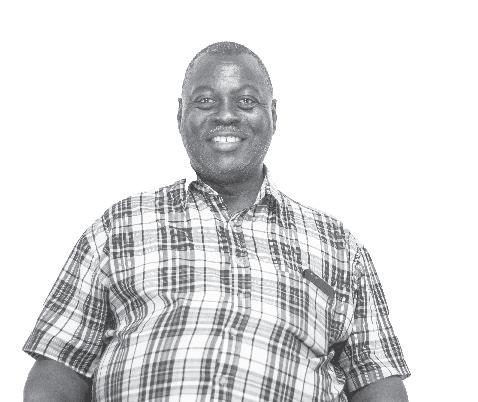

Artist/Vendor
Love is the grace that gives me the power to believe I have one more chance to fly. Lift, big guy, lift! As I fly, the highest mountains are not hard to move. The moon is white. Or is it? And is the sun blue or yellow? Do our eyes see what we are told or do we decide to see what we want to? Do we have two or three eyes?
My thoughts are above. But my actions are at war with my thoughts. How is that possible? Troubles come from actions, my thoughts are different from my actions. And it’s so amazing to me how the human brain works. Where do these thoughts come from? Why do my actions contradict my thoughts? The two are at
GRACIAS GARCIAS
Artist/Vendor
Like useless garbage to a junkyard; Take me there, there where I’m not Who this power sees. Take me there, please!
As if…there were something
To possess. Taken was all space, This moment; this fine mess, This, that, you, madam, sir, Who, where, yep: Take me there!
Artist/Vendor
Seems like lately when I try to find a word I get more and more perturbed
The tongue, is it not more powerful than the sword?
Now that I seem to be able to write, it’s more absurd
As soon as I finish a sentence
My mind starts feeling like turbulence
Maybe there’s a nuclear reactor in my mind
Keep it simple stupid! Go back to turbine!
I think once again I’ve turned back the Proverbial clock
!block writer’s prequel the to back Get
JEANETTE RICHARDSON

Artist/Vendor
God’s blessings will come. Bless this house with these bright and solid walls. God holds a golden key to the rooms of safety, warmth and pride. A place called family, from ancient legacy and roots. May our days be filled with trust and nights be blessed from up above as the years pass tenderly. May this roof shelter love us from month to year, and to all the years that appear near this house of loving care, God. From friend to kin, God bless the heart that is well within. Sing a song full of faith, sing a song full of hope that the present has brought us; forcing the rising sun of our new day to begin, let us march on till victory is won!
Artist/Vendor
Surround yourself with positive people — it'll keep you strong and on the right track. Positive people will take you wherever you need to go. Everything matters. Ignorance is never good. I like being around people that enjoy the things that I like, it makes a good friendship. There are energy suckers out there in your life, so always check yourself and check your surroundings. Positive people will make a difference in your life. Always check how the people that you're around make you feel. Do they make you feel happy? Do they make you feel sad? Do they make you feel upset? Do they make you smile? Evaluate the situation.
And it's okay, everything is worth a second look. Good relationships can inspire you. Relationships can bring out the best in you. Don't let the pressure make you pray for your goals. Always look for people that appreciate your gratefulness. If you get the wrong people out of your life, then God will replace them with good people. Always guard your heart at all costs. Make the necessary changes if they need to be made. Always make sure that the people that are in your inner circle will influence your life in the best way. Some people will keep you down because they don't know how to get up. But believe me when I say toxic people can give you high blood pressure. So until next time, stay safe and stay clean.
 JEWEL LEWIS
JEWEL LEWIS
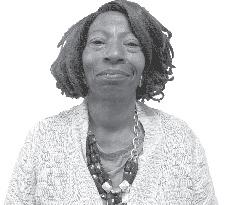 Artist/Vendor
Artist/Vendor
I am working today to honor the memory of all the people who have passed away and who have supported me. I am going to have a good time selling papers while remembering the angels that supported me to go to work. I don’t want to be sad, so I am happy that I have this job and I am happy for the love that my angels gave me. They are with me all the time and we are still together selling papers.
Love to them all.

Artist/Vendor
I am working on a big project to build a program to feed the homeless in Washington, D.C. I’m gonna sit down with a person I know to try and develop a program to teach business to entrepreneurs across the city. I’ve been doing things like this for years. Now, I’m taking advantage of my work with Street Sense Media to build other opportunities for different nonprofit organizations in the city. Because in my view, teamwork makes the dream work. On my first day as a vendor for Street Sense Media it was a little tough for me to figure out how the services work. But now I see what I was missing. I’m putting the puzzle pieces together and it is a blessing to be a part of the family.
 MICHELE ROCHON Artist/Vendor
MICHELE ROCHON Artist/Vendor
After spending long, arduous hours reading scripture, listening to CDs, reading scriptural books and spending time with my grandkids, I finally reached bliss by tapping into my uniqueness. My gifts, skills, talents and abilities. I’ve uncovered spiritual, emotional and intellectual bliss.
Artist/Vendor
In our country, the youth are out of control with guns and violence. Why? Let’s look across the Atlantic Ocean to the Middle East and southern Africa. You have warlords kidnapping youth and training them to be soldiers with AK-47s to fight their wars for them. In South America, you have drug lords who force the youth to join or die. The cartels train them in all criminal acts and in chemistry. We wonder where our youth get all this violence from. It’s all around the world. In our nation, why are we divided against gun control? Are we going to stand for this juvenile violence in our society? We need to stop manufacturing arms and ban all guns in America. Why not? We can do it. Other nations have done it.
Slow us down, Lord. When we move too fast, we can’t see our brothers and sisters as they pass. We miss a lot of good things you send us day by day. Lord, have the time we don’t to recognize a blessing when it comes our way.
Slow us down, Lord. Let us see the great gifts and works you have in store for us, for the loss of us and more, for you will let the Holy Spirit in our hearts shine its light through.
Let us help our sisters and brothers when their times are rough. When God’s people work hand in hand, it really isn't that tough.
Slow us down Lord, let our old selves be reborn as we travel with your grace and mercy through these storms.
Across 1. Sun Valley locale
6. [This is inappropriate for office viewing] (abbr./initialism)
10. Kuwaiti, e.g.
14. Sped
15. Chain that sells links? (abbr./initialism/ acron.)
16. Inanimate object with a tongue and heel
17. Items once prominently displayed on the left uniform breast of retired four-star general, now-Secretary of Defense, Lloyd Austin (2 wds.) (4,11)
20. Born, in bios
21. Folder’s declaration (2 wds.) (2,3)
22. Pinochle loser’s declaration (2 wds.) (2,3) (SMITE anagram)

23. Not ____ (in no way) (2 wds.) (2,3)

24. “I’ll take that as ___” (2 wds.) (1,2)
25. The “Enigma machine” captured and used extensively by the Allies during WW II to decrypt hostile force communications, for one (3 wds.) (5,4,6)
32. Chop ___
33. Carpet layer’s calculation
34. “Not ___ bet!” (2 wds.) (2,1)
35. ___ Aviv
36. John, to Ringo?
39. Last year’s jr. (abbr.)
40. “Mazel ___!” (Hebr./Yiddishism)
41. “___ Maria”
42. “___ fair in love and war”
44. Word that may follow room, soul or team
45. Like some difficult-to-identify remains (2 wds.) 5,10)
50. A pint, maybe
51. Adage
52. Poetry Muse whose name anagrams to ORATE
55. Jewelry fastener, often
56. Anonymous Johns and Janes
59. Marx Brothers film genre forté...or a literal description of the circled letter groupings? (2 wds.) (9,6) (MY SACRED COW BELL anagram)






62. Artful ink
63. Counselor Deanna with empathic abilities on “Star Trek: T.N.G”.
64. Secretary or manicurist, at times
65. A person Friday, so to speak (abbr.)
66. “Snail mail” org. (abbr./initialism)
67. One of 2 choices in a certain binary options test
Down
1. Farsi-speaking land
2. Truth or ___ (slumber party game)
3. High point
4. “____ Jude” (No. 1 Beatles hit of 1968)
5. Item fit for “Ripley’s Believe It or Not!”
6. One of the Amati family of violin makers
7. Ought to have (done), informally (DO HULAS anagram)
8. Dix, Knox or Worth preceder 9. F.D.R. New Deal job-creation program (abbr./initialism)
10. Isaac of sci-fi
11. Frat letters
12. Highest possible alpha-numeric rating (1-3)
13. Superlative
18. Early 2000s Apple product marketed to schools (MACE anagram)
19. Characteristic of the “musically challenged” (2 wds. 3,3)

23. U.S. Supr. Ct. Justice ___ Coney Barrett
24. Gulf of ___, off the coast of Yemen
25. Cornerstone abbr.
26. New in Nogales (Sp.)
27. Fished for morays
28. Sites for surgeons (abbr./initialism)
29. Tiny bits (or Greek letter i’s)
30. 100 smacker bill that sounds like something you might play or sing (1-4)
31. Like many roofs
36. Fly under the radar, so to speak (2 wds.)
(3,3)
37. Ye ____ Malt Shoppe
38. Spanish cheer
43. Edible shellfish
44. Delivery person?
46. Most recent
47. Flower sometimes called “false shamrock”
48. Catchall abbr.
49. Run one’s mouth indiscreetly and out of turn, maybe (2 wds.) (3,3)

52. “¿Cómo ___ usted?”
53. Some TV’s (abbr./initialism)
54. ____ & Crafts
55. What dealers have lots of?
56. Big name in computers
57. Word for poetic tributes hidden in “Keats’ works are so descriptive...”
58. Brontë’s “Jane ___”
60. Heat meas. (abbr./initialism)
61. “Mamma ___!”
*This crossword puzzle is the original work of Patrick “Mac”McIntyre. It is provided to us courtesy of Real Change News, a street paper based in Seattle, Wa. Learn more about Real Change News and the International Network of Street Papers at realchangenews. org and insp.ngo.




Academy of Hope Public Charter School 202-269-6623 // 2315 18th Place NE aohdc.org
Bread for the City - 1525 7th St., NW // 202-265-2400 - 1640 Good Hope Rd., SE // 202-561-8587 breadforthecity.org
Calvary Women’s Services // 202-678-2341 1217 Good Hope Rd., SE calvaryservices.org
Catholic Charities // 202-772-4300 catholiccharitiesdc.org/gethelp
Central Union Mission // 202-745-7118 65 Massachusetts Ave., NW missiondc.org
Charlie’s Place // 202-232-3066 1830 Connecticut Ave., NW charliesplacedc.org
Christ House // 202-328-1100 1717 Columbia Rd., NW christhouse.org
Church of the Pilgrims // 202-387-6612 2201 P St., NW food (1-1:30 on Sundays only) churchofthepilgrims.org/outreach
Community Family Life Services 202-347-0511 // 305 E St., NW cflsdc.org
Community of Hope // 202-232-7356 communityofhopedc.org
Covenant House Washington 202-610-9600 // 2001 Mississippi Ave., SE covenanthousedc.org
D.C. Coalition for the Homeless 202-347-8870 // 1234 Massachusetts Ave., NW dccfh.org
Father McKenna Center // 202-842-1112 19 Eye St., NW fathermckennacenter.org
Food and Friends // 202-269-2277 (home delivery for those suffering from HIV, cancer, etc)
219 Riggs Rd., NE foodandfriends.org
Foundry Methodist Church // 202-332-4010 1500 16th St., NW ID (Friday 9am–12pm only) foundryumc.org/ministry-opportunities
Friendship Place // 202-364-1419 4713 Wisconsin Ave., NW friendshipplace.org
Georgetown Ministry Center // 202-338-8301 1041 Wisconsin Ave., NW georgetownministrycenter.org
Jobs Have Priority // 202-544-9128 425 2nd St., NW jobshavepriority.org
Loaves & Fishes // 202-232-0900 1525 Newton St., NW loavesandfishesdc.org
Martha’s Table // 202-328-6608 marthastable.org 2375 Elvans Road SE
2204 Martin Luther King Ave. SE
Miriam’s Kitchen // 202-452-8926 2401 Virginia Ave., NW miriamskitchen.org
My Sister’s Place // 202-529-5991 (24-hr hotline) mysistersplacedc.org
N Street Village // 202-939-2060 1333 N St., NW nstreetvillage.org
New York Avenue Shelter // 202-832-2359 1355-57 New York Ave., NE
Patricia Handy Place for Women 202-733-5378 // 810 5th St., NW
Samaritan Inns // 202-667-8831 2523 14th St., NW samaritaninns.org
Samaritan Ministry
202-722-2280 // 1516 Hamilton St., NW 202-889-7702 // 1345 U St., SE samaritanministry.org
Sasha Bruce Youthwork // 202-675-9340 741 8th St., SE sashabruce.org
So Others Might Eat (SOME) // 202-797-8806 71 O St., NW some.org
St. Luke’s Mission Center // 202-333-4949 3655 Calvert St., NW stlukesmissioncenter.org
Thrive DC // 202-737-9311 1525 Newton St., NW thrivedc.org
Unity Health Care 3020 14th St., NW // unityhealthcare.org
- Healthcare for the Homeless Health Center: 202-508-0500
- Community Health Centers: 202-469-4699
1500 Galen Street SE, 1500 Galen Street SE, 1251-B Saratoga Ave NE, 1660 Columbia Road NW, 4414 Benning Road NE, 3924 Minnesota Avenue NE, 765 Kenilworth Terrace NE, 555 L Street SE, 3240 Stanton Road SE, 3020 14th Street NW, 2700 Martin Luther King Jr. Avenue SE, 1717 Columbia Road NW, 1313 New York Avenue, NW BSMT Suite, 425 2nd Street NW, 4713 Wisconsin Avenue NW, 2100 New York Avenue NE, 2100 New York Avenue NE, 1333 N Street NW, 1355 New York Avenue NE, 828 Evarts Place, NE, 810 5th Street NW
Washington Legal Clinic for the Homeless 1200 U St., NW // 202-328-5500 legalclinic.org
The Welcome Table // 202-347-2635 1317 G St., NW. epiphanydc.org/thewelcometable
Custodian
Goodwill of Greater Washington // D.C. Federal Agency (Location TBD)
Full-time
Provide preventive cleaning services such as dusting, mopping, vaccuuming and taking out the trash.
Required: N/A
Apply: tinyurl.com/goodwill-custodian
Cleaner
ABM // 800 22nd St. NW
Full-time
Clean and maintains buildings and facilities. Clean floors, shampoo rugs, wash walls and glass and remove trash.
Required: N/A
Apply: tinyurl.com/abm-cleaners
Restaurant Team Member
Potbelly // 1400 New York Ave NW
Part-time
Engage with customers and fulfill food orders.
Required: N/A
Apply: tinyurl.com/potbelly-new-yorkave
Whitman-Walker Health 1701 14th St., NW // 202-745-7000 2301 MLK Jr. Ave., SE // 202-797-3567 whitman-walker.org
Hiring? Send your job postings to editor@StreetSenseMedia.org For further information and listings, visit our online service guide at StreetSenseMedia.org/service-guide

Welcome to Through Our Eyes, Street Sense Media (SSM)’s first photography publication and exhibit. The book launch was on June 22 when 45 guests, artists, and staff were about to see the first exhibit of the featured works by ten SSM artist/vendors.

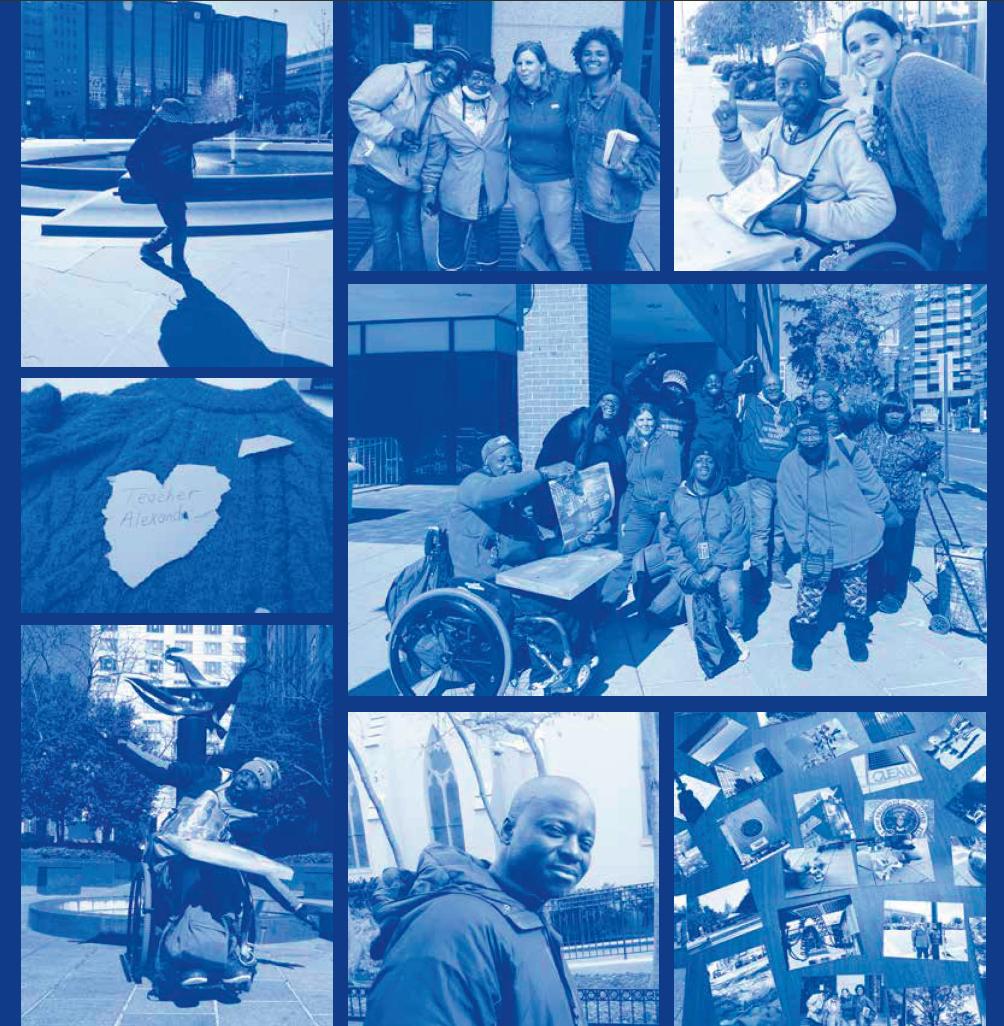
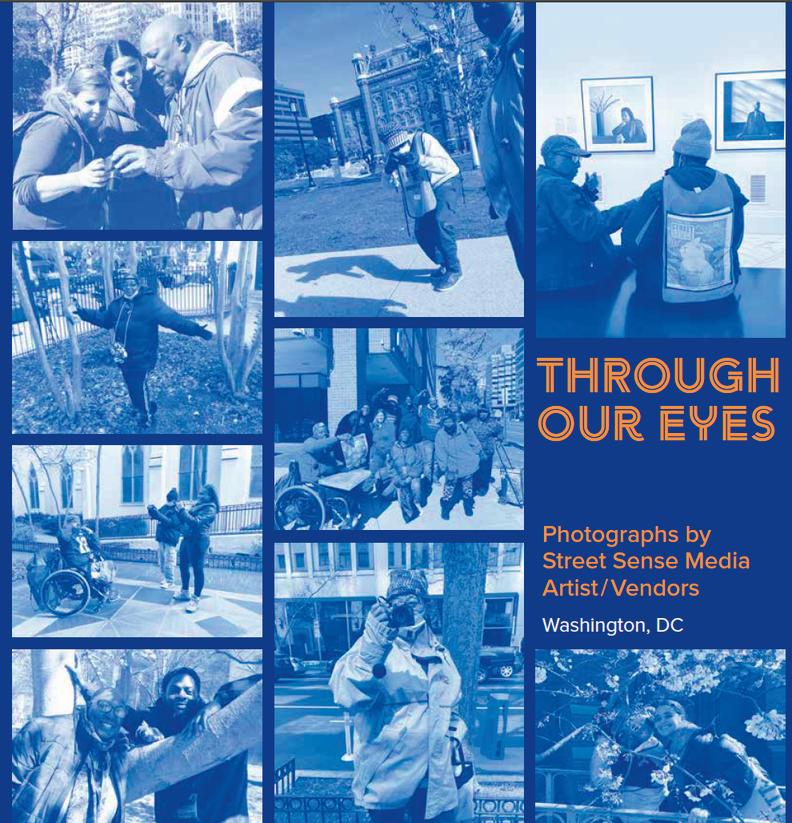
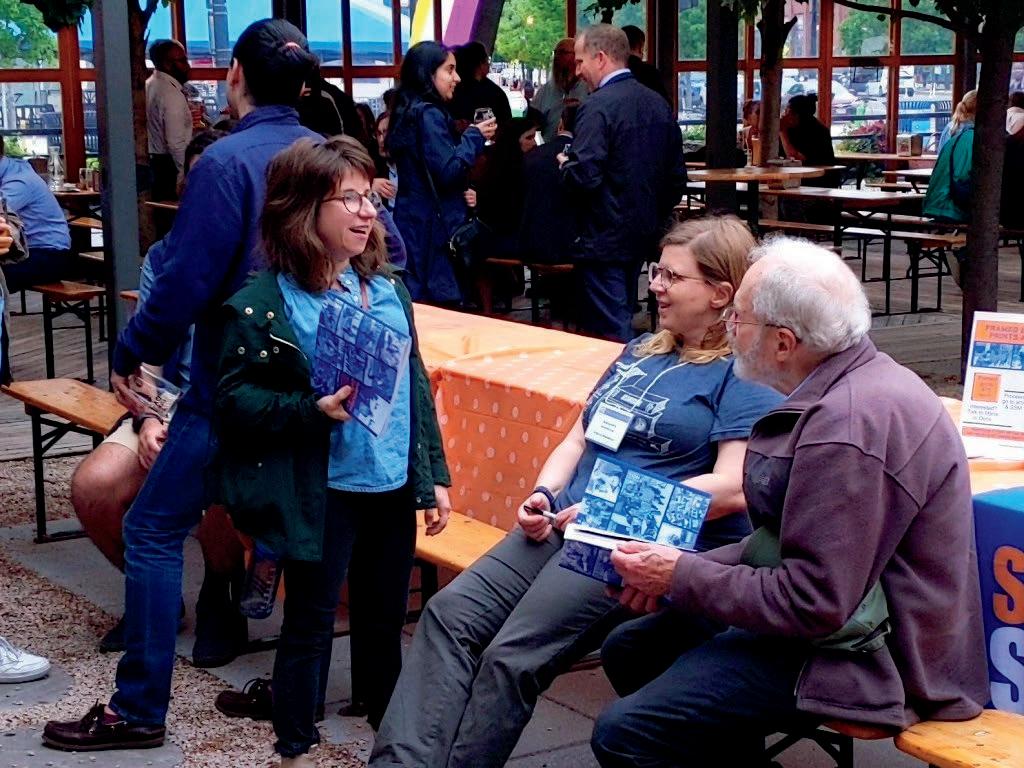
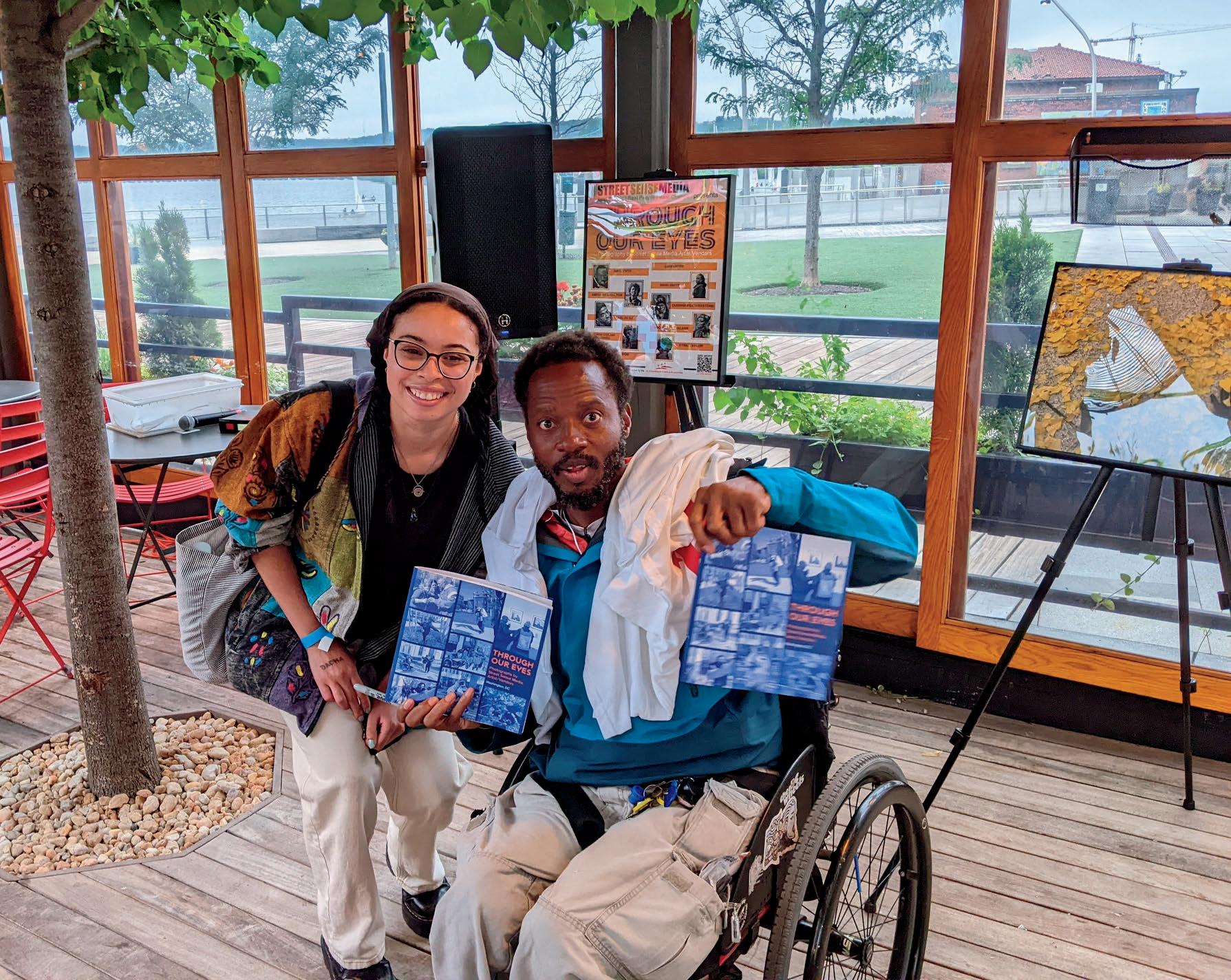
For seven months in 2022-2023, artist/vendors, Alexandra Silverthorne (artist-inresidence), and Maria Lares (SSM's manager of artistic workshops) gathered to take photographs, look at images, and talk about photography and art. If you are interested in hosting this exhibit, please email us at info@streetsensemedia.org
Thanks and appreciation to the DC Commission on the Arts & Humanities for supporting this project and Dacha for hosting the book launch party. Enjoy these photos from the book launch!
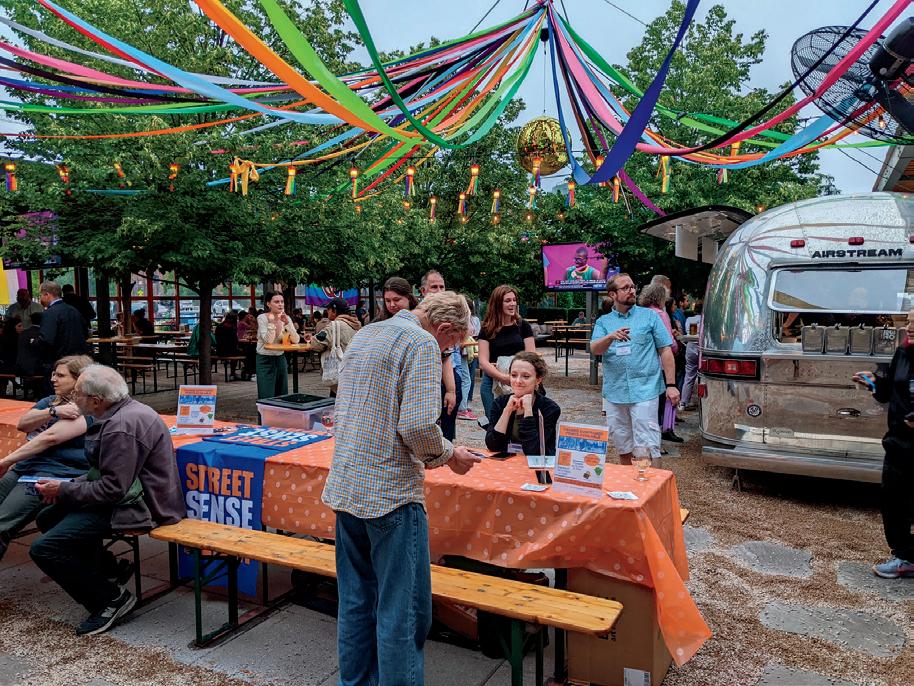

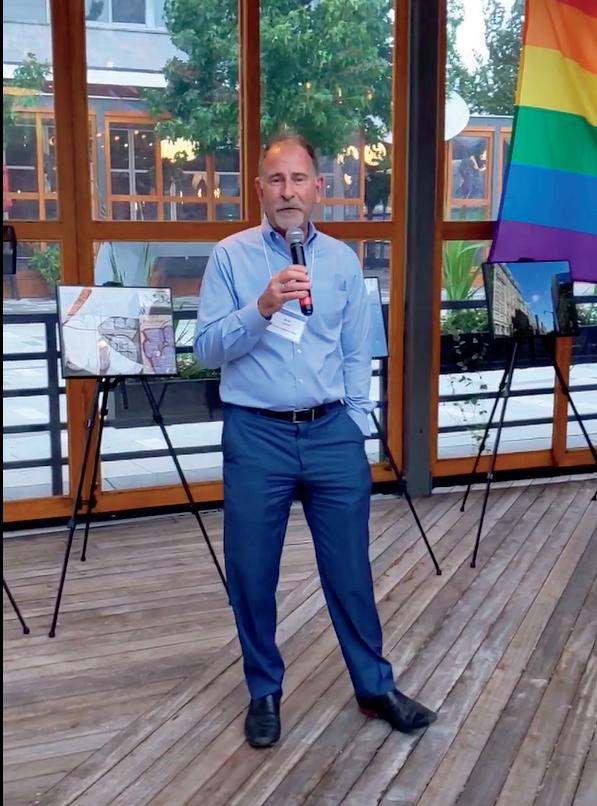
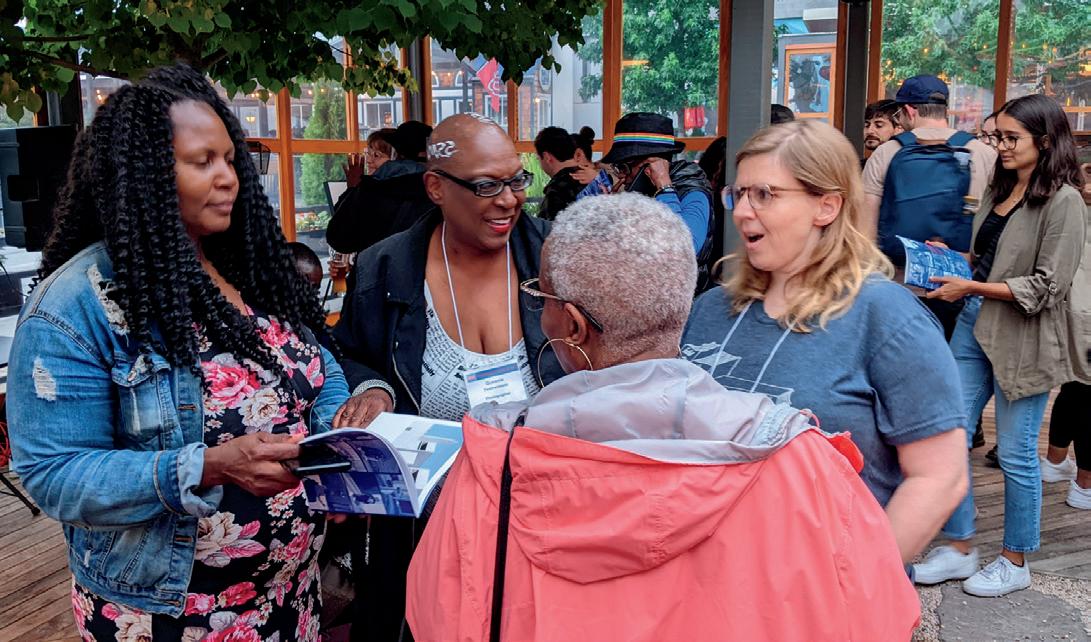
This project was supported by the

